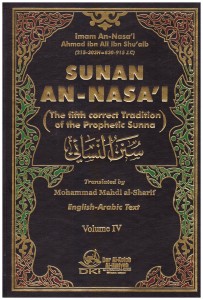
Imam An-Nasa’i was fond of seeking knowledge especially the narration of hadiths, for which he has devoted his whole life.
He is Abu `Abdur-Rahman Ahmad ibn Shu`ayb ibn `Ali ibn Sinan ibn Bahr Al-Khurasani An-Nasa’i, attributed to his homeland Nasa. He was a great memorizer and critic of Hadith and one of the key figures in Muslim scholarship. He was renowned for his utmost extensive awareness of the defects of Hadith and the conditions of the narrators. He is the author of the famous book of Hadith “Sunan An-Nasa’i” or “As-Sunan As-Sughra” as he named it.
His Birth and Early Life
An-Nasa’i was born in Nasa, a town in Khurasan, in 214 AH. He started learning knowledge at a very early age. He began his scientific journeys when he was 15 years old when he travelled to the great scholar of Hadith Qutaybah ibn Sa`id in Baghlan. Qutaybah narrated hadiths from Imam Malik , Al-Layth ibn Sa`ad and other narrators of this class. Abu `Abdur-Rahman An-Nasa’i remained with Qutaybah for 14 months studying hadith at his hands. Imam An-Nasa’i was fond of seeking knowledge especially the narration of hadiths, for which he has devoted his whole life. Thus, he became a leading scholar and superior Hadith authority of his time.
Features of His Character
- `Abu `Abdur-Rahman was a dedicated worshipper. Abu Al-Husain Muhammad ibn Muzfir said, “I heard from our sheikhs in Egypt their acknowledgement of his (Abu Abdur-Rahman’s) advancement and leadership in knowledge. They stressed his diligence in worship at all times and his persistence in offering Hajj and partaking in Jihad.”
- He used to fast one day and break the other, a habitual worship of the Prophet Dawud (David, peace be upon him).
- He was a courageous fighter. He used to go for Jihad and showed excessive boldness and sacrifice for Muslims.
- He was good-faced and bright-colored. He had 4 wives and 2 maid slaves. It was narrated that he would share his time between his wives and maid slaves equally.
- He would prefer to wear the Nubian garments and eat cocks that were bought, fattened and castrated for him.
His Pursuit of Knowledge
Imam An-Nasa’i remained with his Sheikh Qutaybah for more than one year, then he travelled to many places including Khurasan, Al-Hijaz, Egypt, Iraq and the Ash-Sham (the Levant). After these long journeys, he settled in Egypt where students of Hadith came to him from everywhere narrating hadiths from him and learning at his hands. He was a trustworthy, well-established scrutinizer of Hadith and its narrators and was fully aware of the juristic rulings and explanation of the hadiths. Imam Al-Hakim said, “The sayings of Imam An-Nasa’i regarding the Fiqh (Jurisprudence) of hadiths are many, and one is astonished about the perfection of his words.”
Among his prominent Sheikh were Qutaybah ibn Sa`id, Is-haq ibn Ibrahim, Is-haq ibn Rahuwayih, Abu Bakr Bindar, Hisham ibn `Ammar, Muhammad ibn An-Nadr, Suwaid ibn Nasr, Ziyad ibn Ayyub, Sawwar ibn `Abdullah Al-`Anbari, `Utbah ibn `Abdullah Al-Marwazi, Muhammad ibn Muthanna, and many others.
And among notable students who took hadiths from him were Ahmad ibn Muhammad ibn Salamah Al-Azdi, the renowned Hanafi scholar of Fiqh; Ahmad ibn Muhammad Al-Hashimi, known as Ibn As-Sunni, the great trustworthy memorizer of hadith; Sulaiman ibn Matir Al-Lakhmi At-Tabarani, the greatest memorizer of Hadith; Abu Ja`far At-Tahawi; Abu `Uthman An-Naysaburi; Hamzah ibn Muhammad Al-Kinani; Abu Ja`far Ahmad ibn Isma`il An-Nahhas An-Nahawi and many others.

Imam An-Nasa’i has compiled many books of Hadith, the most renowned of which is his book As-Sunan Al-Sughra known as Sunan An-Nasa’i or Al-Mujtaba.
His Books:
Imam An-Nasa’i has compiled many books of Hadith, the most renowned of which is his book As-Sunan Al-Sughra known as Sunan An-Nasa’i or Al-Mujtaba which is a briefing of his book of Hadith As-Sunan Al-Kubra. Also, he compiled other books including:
- Fada’il Al-Qur’an
- At-Tabaqat
- Fada’il As-Sahabah
- `Amal Al-Yawm wa Al-Laylah
- Rasa’il fi `Ulum Al-Hadith
- Ad-Du`afa’ wal-Matrukin
Scholarly Praise:
Imam An-Nasa’i received a great commendation from many of the prominent scholars of Hadith which testifies to his encyclopedic memorization, mastery and awareness of deficiencies and narrators of hadiths.
- Imam Adh-Dhahabi said, “There was no one on the onset of the 300 AH year more perfect in memorization than An-Nasa’i. He was well-versed in Hadith, its deficiencies and narrators, even more than Muslim, Abu Dawud and Abu `Isa (At-Tirmidhi). He was in the same rank of Al-Bukhari and Abu Zur`ah.”
- Al-Qadi Taj Ad-Din As-Subki said, “I asked our sheikh Adh-Dhahabi, ‘Who was more perfect in memorization Muslim ibn Al-Hajjaj or An-Nasa’i?”’ He replied, “An-Nasa’i,” and I mentioned this to my father who agreed to it.”
- Ad-Daraqutni said, “Abu `Abdur-Rahman (An-Nasa’i) was placed at the top of all the scholars of this (hadith) knowledge in his era.”
- Abu `Ali An-Naysaburi said, “The unchallenged leading scholar of Hadith is Abu `Abdur-Rahman An-Nasa’i, who narrated hadiths to us.”
- Abu `Abdullah ibn Mandah said, “Those who narrated the authentic hadiths and distinguished the established from the deficient and the truth from the falsehood are only four: Al-Bukhari, Muslim, Abu Dawud and Abu `Abdur-Rahman An-Nasa’i.”
- Imam Ad-Daraqutni said, “Abu Bakr Al-Haddad Ash-Shafi`i narrated lots of hadiths but he did not narrate to others except the hadiths of An-Nasa’i. He said, ‘I accepted him (An-Nasa’i) as an excuse between me and Almighty Allah.”’
- Ibn Al-Athir said, “He (Abu `Abdur-Rahman An-Nasa’i) adopted the Shafi`i school of Fiqh, and he had some rituals according to the school of Imam Ash-Shafi`i. He was a devout and well-verified scholar.”
His Death:
Abu `Abdullah Al-Hafiz said, “I heard `Ali ibn `Umar saying, ‘`Abu `Abdur-Rahman An-Nasa’i was the most knowledgeable among the Sheikhs of Egypt in terms of Fiqh, and authenticity and narrators of hadiths, during his time. Being the best among them, they felt envy towards him. Thus, he moved to Ar-Ramlah (a town in Palestine) where he was asked about Mu`awiyah ibn Abu Sufyan. He did not reply in a good thing, and thus people beat him badly. He asked to be moved to Makkah, in spite of his illness, where he passed away. Abu `Abdullah said, “In addition to his multiple merits, he was given martyrdom at the end of his life.” However, there are other opinions that he died in Palestine. He passed away on Monday 13 Safar 303 AH.
————————————————-
Sources:
- Tahdhib Al-Kamal by Al-Hafiz Al-Mizzi
- Tahdhib At-Tahdhib by Ibn Hajar
- Wafiyyat Al-A`yan by Ibn Khallikan
- Tadhkirat Al-Huffaz by Adh-Dhahabi
- Al-Wafi bi Al-Wafiyyat by As-Safadi
- Tabakat Ash-Shafi`iyah by As-Subki
- Al-Bidayah wa An-Nihayah by Ibn Kathir
———
Read also:
Al-Bukhari: The Imam of Hadith and Sunnah
Muslim: The Leading Scholar of Hadith
At-Tirmidhi: Imam of Hadith and Fiqh

